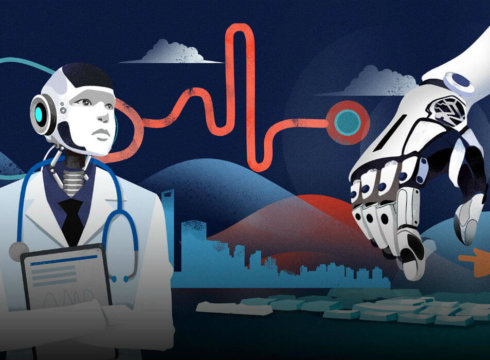SUMMARY
HealthTech Startups Are Using AI And IoT To Infuse New Age Innovations In Healthcare
Inc42 Daily Brief
Stay Ahead With Daily News & Analysis on India’s Tech & Startup Economy
With over $410 Bn of expected investment in healthcare IoT technologies by 2022, the sector is at a watershed moment to witness a wave of ‘new age innovations’, which will reorder the country’s healthcare landscape. This disruption is driven by tech-focused startups that are using Artificial intelligence (AI), contextual intelligence and deep learning algorithm by leveraging the ethos of Design, Innovation & Creativity led Entrepreneurship (D.I.C.E.) to bring technology from back-end to forefront of the clinical experience.
With healthcare market in India poised to grow to $280 Bn by 2020, healthtech is positioned to take up the mantle of providing quality healthcare services efficiently, and we must adapt and scale key technological trends to bring ‘Future to the Present’.
Firstly, AI, via intelligent automation and ability to make every interface ‘smart & simple’, is redefining the contours of healthcare delivery and administration across the entire health ecosystem.
A case in point is HealthTap, which has recently launched Dr. AI, a personal AI-powered “physician” that instantaneously translates a person’s symptoms into personalised, doctor’s recommended course of action. In fact, Chinese AI-powered robot Xiaoyi has already become the world’s first robot to pass the medical licensing exam.
Secondly, Big Data is changing the dynamics in the preventive healthcare segment, with the focus now on understanding as much about a patient and as early as possible – leading to identifying warning signs of serious illness at an early stage, to make the treatment simple and inexpensive.
A case in point is the collaboration between Apple and IBM on a big data health platform that will allow iPhone and Apple Watch users to share data to IBM’s Watson Health cloud healthcare analytics service to discover new medical insights from crunching real-time activity and biometric data from millions of potential users.
Thirdly, organisations have now realized that medical care should be patient-centric, and should not be organised solely around the enterprise. This is transcending into non-traditional partnerships leading to the new digital ecosystem, which are unlocking the next waves of growth.
A case in point is CareMore Health System which has partnered with Lyft, transport network company, to provide non-emergency medical transportation for Medicare beneficiaries. Individuals using the service wait less than nine minutes to be taken to their medical appointment—that is a 30% reduction in waiting time and also the cost of transportation has dropped from about $31 per ride to $21
Lastly, the emergence of Robotic Surgery as a technological add-on for Telemedicine, especially in remote and rural areas is making minimal access surgery universally accessible and affordable by expanding the range of procedures that can be performed. Global annual revenues for robot-assisted minimal access surgery are ~ $4 Bn and are expected to touch $20Bn by 2025.
A case in point is Intuitive Surgical’s da Vinci robot, which is now used for laparoscopic/minimally invasive surgery (MIS), and procedures such as hysterectomies, bypass surgeries and removing cancerous tissues may be used in future to enable access in remote areas.
The indispensable benefit associated with HealthTech has transcended into FDA coming up with Digital Health Innovation Action Plan which provides Software Precertification (Pre-Cert) Pilot Program to accelerate HealthTech innovation without the stifling controls and processes normally associated with regulatory approvals.
The approach is likely to expand the market for innovative new digital health solutions while also providing a boost to traditional medical device companies.
In India, we must make similar concerted collaborative efforts among both public and private stakeholders to create an enabling HealthTech ecosystem, and match intensified demand, optimise costs and demonstrate value.
With healthcare expenditure expected to reach ~USD 9.6 Tn per year by 2018, there is an urgent need to catalyze innovative approach to ensure affordable and accessible healthcare for all. The advent of HealthTech is that ‘Penicillin moment’ in medical science which will enable sustainable quality healthcare delivery and save more lives than all other efforts combined.
[This article is Powered by YES Bank & is part of branded content series]
Note: We at Inc42 take our ethics very seriously. More information about it can be found here.


